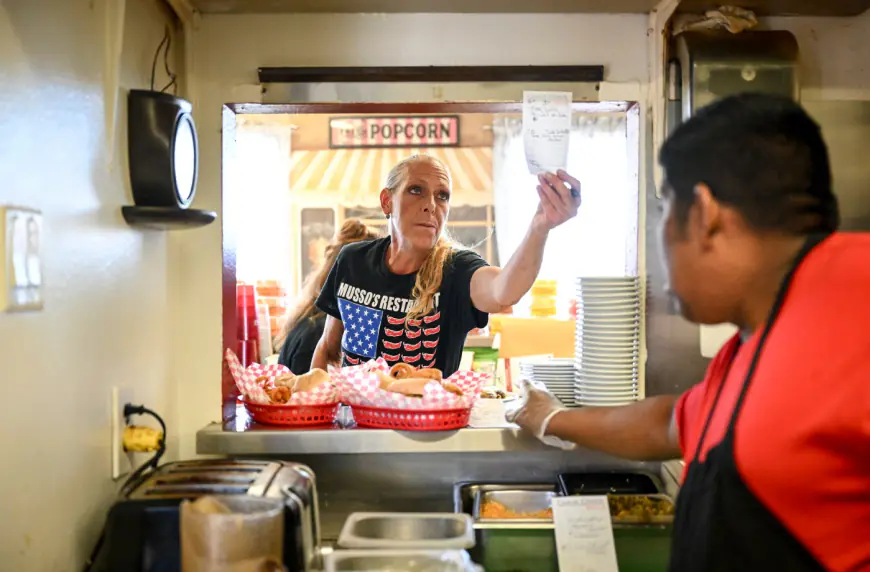In Pueblo, sausage sandwiches and sloppers reign supreme in local cuisine
Lisa Musso-Marino buzzed around her family's restaurant in cowboy boots and denim. The Pueblo native dashed to the ringing phone to jot down takeout orders, chatted up regulars she's known for years and hand delivered the house specialty to tables: the Sicilian sausage sandwich, nicknamed the "fuggedaboudit."

PUEBLO, Colo. — Lisa Musso-Marino buzzed around her family’s restaurant in cowboy boots and denim. The Pueblo native dashed to the ringing phone to jot down takeout orders, chatted up regulars she’s known for years and hand-delivered the house specialty to tables: the Sicilian sausage sandwich, nicknamed the “fuggedaboudit.”
The creation by Musso’s Restaurant, 35250 E. U.S. 50, stars a secret sausage recipe developed by Musso-Marino’s great-grandfather, an immigrant from Sicily. He passed it down to her grandfather, Henry George Musso, who passed it down to her father, Henry Carl Musso.

The latter Henry and his Italian-American wife, Barbara Lee, decided to open the restaurant in 1991. Musso-Marino was next in line to learn the recipe.
So, you could say that generations of Musso hands shaped the sausage patty now found tucked into a homemade bun and served with a slathering of Pueblo green chile, lettuce, tomato and the customer’s choice of Provolone, American or Swiss cheese.
The Musso family counts as a living example of Pueblo’s longstanding Italian heritage. The city’s cuisine is largely colored by the influence of immigrants from Italy and the island off its coast, Sicily. They started moving to Colorado in the 1850s, heading to Pueblo for jobs in the farming, smelting and steel industries, with The Colorado Fuel and Iron Co. employing many.
However, Italians weren’t the only ones making the journey.
“Immigrants and domestic migrants flocked to Pueblo to work in the mill, making it one of Colorado’s most diverse cities,” Colorado Encyclopedia reports. “Irish, Italians, Germans, Slovenians, Serbs, Croats, Greeks, and Mexicans all worked and made homes there.”
Today’s food scene pays respect to the city’s history. For example, Fuel & Iron Food Hall operates out of the former Holmes Hardware Building at 400 S. Union Ave.
But one ingredient has remained at the heart of Pueblo’s fare: green chile, which has grown in the area since the 19th century, according to History Colorado. Decades of cultivation resulted in a local strain. The Pueblo Chile Growers Association describes it as a “thicker and spicier” pepper, and it’s in constant competition with New Mexico’s more famous Hatch chiles.
Pueblo’s peppers typically grow from July through October. They’re harvested in the late summer, and then bushelfuls are shipped to metro Denver to be sold at chile stands, groceries and farmers markets. Most are roasted before being used, and the final product adds a zing to savory meals like pasta and quesadillas. Henry Carl Musso has been described by The Pueblo Chieftain as “one of the pioneers of the iconic roasted Pueblo chile.”
Culinary traditions that use chiles, including the sausage sandwich and the “slopper” (another Pueblo creation), are gradually catching on outside of the city, but they haven’t been wholeheartedly embraced by the state — yet. An attempt at serving a Pueblo-inspired menu at Fuel & Iron Bar in Denver’s LoDo neighborhood flopped after its opening in 2022.
Whether their delicacies are widely received by the public or not, Pueblo restaurateurs are busy keeping up with demand at home.

Sicilian sausage sandwich
Outside of Musso’s Restaurant, a sign beckons drivers from the road: “Musso’s homemade Sicilian sausage sandwiches.” Since opening day, the best-seller has had a place on the menu.
Musso-Marino tries to entice customers with daily specials, but they prefer tried and true favorites. The sentiment aligns with the restaurant’s time capsule aesthetic.
In late August, Musso-Marino took a momentary break from her duties to gaze at a photograph hanging on the wall: one of her and her older brother, Carl Jr. Musso, in a corn field. With tears in her eyes, her voice caught in her throat as she reminisced on her “farmer’s daughter” upbringing, growing up alongside the sweet corn and strawberries.
She spent mornings picking peppers and green beans at the family farm in Vineland — an inheritance passed down alongside the secret recipe. Musso-Marino attended Pueblo County High School, which sits across the street from the restaurant.

She considered careers in nursing and criminal justice. Ultimately, she took over the restaurant from her father. Meanwhile, her brother and nephew handle nearby Musso Farms, which spans around 150 acres — and is just a five-minute drive from Musso’s Restaurant.
“My dad was my role model, and he’s the one that taught me a lot,” Musso-Marino said. “After we opened this restaurant, I knew this was my place to be.”
Over the past three decades, Musso-Marino has grappled with rising prices and the impacts of the COVID-19 pandemic, but she and her husband, Rocky Marino, continue pushing forward, honoring their shared Italian heritage.
And her father still makes daily appearances, stopping by each morning.

Other restaurants in Pueblo offer similar sandwiches with sausage and locally-grown peppers, but Musso-Marino called the Sicilian sausage sandwich “a Musso thing.”
Her other best-seller is the slopper: an open-faced sandwich smothered with pork green chile. Musso’s Sicilian slopper features Sicilian sausage as the protein, whereas Musso’s special slopper includes a cheeseburger instead.
However, the lore behind that dish is better told over at Gray’s Coors Tavern and at The Sunset Inn Bar and Grill, Musso-Marino admitted.

Sloppers at Gray’s Coors Tavern
Gray’s Coors Tavern, 515 W. 4th St., was so busy on a recent Wednesday lunch rush that not a single empty space remained in its adjacent parking lot. Inside, the tavern glowed with the light of neon signs: Bud Light, Coors Light, Michelob Ultra.
At the bar, regulars scarfed down their meals and watched a football game on a TV mounted on the wall. Next to it sat a shelf of helmets — each representing a local high school team.

Siblings Gary Zerfas and Carrie Fetty sat across from each other in a booth. Their parents, Gary and Carolyn Gray, purchased the joint in 1982 with their nephew, Don. In 2018, Zerfas, Fetty and their brother, Dean Gray, bought Don’s half of the business.
But the tavern existed long before the Grays entered the picture. It first opened in 1934 as a place for Coors Brewing Co. to sell its beer (and only its beer) — a move orchestrated by brewer Adolf Coors II himself, according to some tellings, both oral and written. Coors may have had his hand in the naming and opening of several other Colorado bars as well.
One of his employees, Adolf Otterstien, traveled to Pueblo from the brewery in Golden to help set up the pub. The pair decided to utilize an existing bar: Schaffer’s, which also operated as a brothel. They partnered with a local, Johnnie Greco, and Johnnie’s Coors Tavern was born.
It was under Greco that the slopper came to be. Local accounts date its creation to the 1950s. According to the folks at Gray’s Coors Tavern, business owner Herb Casebeer asked Greco for a burger smothered in red chili, and he dubbed it “a slopper.”

After the Grays took up the gauntlet, the business became a family affair. While each of their three children pursued their own careers — Zerfas in police work, Fetty and Gray in education — the trio gravitated back to Gray’s Coors Tavern.
The establishment is now known for its green chile sloppers. Served in a bowl, the open-faced cheeseburger is drowned in a smorgasbord of Pueblo green chile, fries and chopped onions.
It’s the top seller “by a long shot,” Zerfas said. For him, it comes down to the green chile, which the cook makes in-house daily.
“It’s word of mouth, really,” Zerfas said. “People hear about a slopper; they want to come down to Pueblo, and we’re the place to go.”
Greco spread word of the slopper as far as Hawai’i, The Pueblo Chieftain reports, and television fame helped build the dish’s reputation.
In 2010, the Travel Channel’s Food Wars series traveled to Pueblo to pit Gray’s Coors Tavern and The Sunset Inn against each other in a battle royale over sloppers.

Sloppers at The Sunset Inn
The spot that took gold: The Sunset Inn, at 2808 Thatcher Ave.
Gerda Chavez has owned the bar and grill for 44 years. She first moved to the U.S. from Germany after marrying her late husband, Charles, who served in the Army.
In her home country, she was used to eating schnitzel and bratwurst sausage, with dumplings, red cabbage and sauerkraut on the side. Once Chavez resettled in Pueblo, her mother-in-law taught her how to cook Mexican-American food.
Chavez’s spouse used to work for Coors distributing, then he noticed that the Sunset Inn was for lease. Charles decided to pursue the business venture as a means of providing his family with financial security.
A decade later, the patriarch began serving food and set up a small kitchen in 1990.
The Sunset Inn serves both its famous green chile slopper and red chili slopper, which incorporates red chili beans.
Originally, the bar only fit about 40 people, Chavez said, “but, sometimes, 110 used to come in.” In 2003, the pair bought the property and expanded it.
Then came Food Wars, which put the city “on the map for the sloppers,” Chavez added.
And as always, in Pueblo, you can’t forget the green chile.
“There’s no other place growing it — or being as tasty — as it is here,” Chavez said.
What's Your Reaction?









































































































